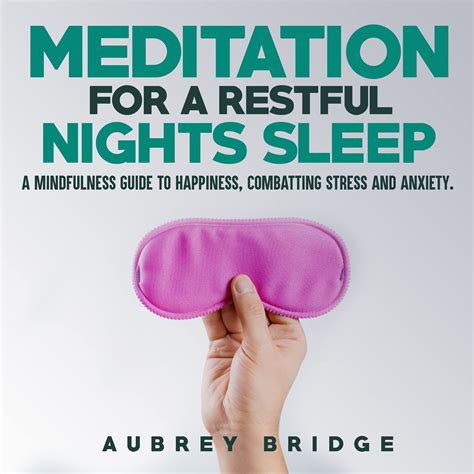Are you struggling to find a restful night's sleep? Look no further! This article will provide you with invaluable techniques to boost the caliber of your slumber without resorting to complex or costly remedies. By adopting these practical and natural approaches, you can optimize the tranquility of your sleep and wake up feeling refreshed and invigorated each morning.
Emphasize Comfort
One fundamental aspect of enhancing your sleep quality is ensuring that your sleep environment is conducive to relaxation and comfort. Give careful consideration to factors such as the firmness of your mattress and pillow, the room temperature, and the level of illumination. Creating a serene atmosphere plays a pivotal role in achieving deep and undisturbed slumber.
Invest in a high-quality mattress and pillows that align with your unique preferences. Experiment with different textures and materials to discover what works best for you. Additionally, fine-tune the temperature and lighting in your bedroom to reflect an ambiance of tranquility. These small adjustments can make a significant difference in the quality of your sleep.
Establish a Consistent Sleep Routine
Developing a regular sleep schedule can do wonders for improving the overall quality of your rest. Our bodies are inherently designed to adhere to a circadian rhythm, a natural cycle that regulates our sleep-wake patterns. By going to bed and waking up at the same time every day, you can effectively train your body to achieve a more restful night's sleep.
Make it a priority to establish a pre-sleep routine that allows you to unwind before bedtime. Engage in soothing activities such as reading a book, taking a warm bath, or practicing mindfulness meditation. These relaxation techniques signal to your body that it's time to wind down, paving the way for a more peaceful sleep experience.
Create a Soothing Bedtime Routine

In order to achieve a restful night's sleep, it's important to establish a calming bedtime routine that promotes relaxation and prepares your mind and body for rest. By incorporating simple yet effective practices into your evening routine, you can create a serene atmosphere that sets the stage for a peaceful slumber.
Set the Mood: Before settling into bed, create an environment that promotes tranquility. Dim the lights, play soft, soothing music, or use essential oils like lavender to create a peaceful ambiance in your bedroom.
Unwind with Relaxation Techniques: Engage in activities that help quiet your mind and release tension from your body. Consider practicing deep breathing exercises, meditation, or gentle stretching to help calm your thoughts and relax your muscles.
Avoid Electronic Devices: The blue light emitted by electronic devices can disrupt your body's natural sleep-wake cycle, making it harder to fall asleep. Make it a habit to power down your devices at least an hour before bedtime to give your mind a chance to unwind.
Establish a Consistent Sleep Schedule: Keeping a regular sleep schedule can help regulate your body's internal clock and improve the quality of your sleep. Aim to go to bed and wake up at the same time every day, even on weekends.
Practice Nighttime Self-Care: Incorporate self-care activities into your bedtime routine to promote relaxation and reduce stress. This could include taking a warm bath, reading a book, or journaling to help clear your mind before sleep.
Create a Comfortable Sleep Environment: Invest in a supportive mattress and pillows that are suited to your preferences to ensure optimal comfort. Keep your bedroom cool, dark, and quiet to create an ideal sleeping environment.
Avoid Stimulants and Heavy Meals: Limit your intake of caffeine and alcohol, especially in the evening, as these substances can interfere with your sleep. Additionally, avoid large, heavy meals close to bedtime, as they can cause discomfort and disrupt your sleep.
Relaxation Techniques: Experiment with different relaxation techniques to find what works best for you. Whether it's practicing mindfulness, using guided imagery, or listening to calming nature sounds, find a method that helps you unwind and prepares you for a deep, restful sleep.
Consistency Is Key: Consistently follow your bedtime routine to reap the benefits of a peaceful night's sleep. By creating a relaxing atmosphere and incorporating soothing activities into your routine, you can improve your sleep quality and wake up feeling refreshed and rejuvenated.
Maintain a Consistent Sleep Schedule
Establishing and sticking to a regular sleep schedule can greatly improve the quality of your sleep. By following a consistent sleep routine, you can optimize your body's natural sleep-wake cycle, also known as the circadian rhythm, and promote better overall sleep.
- Set a fixed bedtime and wake-up time: Going to bed and waking up at the same time every day helps regulate your body's internal clock. This consistency reinforces your sleep patterns and promotes a more restful and rejuvenating sleep.
- Avoid irregular sleep patterns: Inconsistent sleep schedules, such as staying up late on weekends and then trying to compensate by sleeping in, can disrupt your circadian rhythm. This can result in difficulty falling asleep, maintaining sleep, and feeling refreshed.
- Foster a bedtime routine: Establishing a relaxing pre-sleep routine can signal to your mind and body that it's time to wind down and prepare for sleep. Engage in activities like reading a book, taking a warm bath, or practicing gentle stretching exercises to promote relaxation and prepare yourself for a restful night's sleep.
- Limit daytime napping: While short power naps can be beneficial, excessive daytime napping can interfere with your ability to fall asleep at night. If you're struggling with sleep, try to avoid daytime naps or limit them to no more than 20-30 minutes.
- Avoid stimulating activities before bed: Engaging in stimulating activities before bedtime, such as intense workouts, screen time, or consuming caffeine, can make it difficult for your body to unwind and prepare for sleep. Instead, opt for calming activities like practicing mindfulness, listening to soothing music, or engaging in light stretching.
- Create a sleep-friendly environment: Make sure your sleep environment is conducive to quality sleep. Keep your bedroom cool, dark, and quiet, and invest in comfortable bedding and a supportive mattress. Clear your sleep space of any distractions, such as electronic devices or excessive clutter, that may hinder your ability to relax and fall asleep.
By maintaining a consistent sleep schedule, you can establish healthy sleep habits and improve the quality of your sleep, leading to increased energy, improved mood, and better overall well-being.
Creating an Optimal Sleeping Environment

Designing a comfortable sleep environment can significantly improve the quality of your rest and help you wake up feeling refreshed and energized. By optimizing your surroundings, you can create a peaceful atmosphere that promotes relaxation and enhances your sleep experience.
- Choose a suitable mattress and pillow:
Selecting a mattress and pillow that provide adequate support and comfort is essential for a restful night's sleep. Consider your sleeping position and any specific preferences you may have, such as firmness or softness, when choosing these sleep essentials. - Regulate the temperature:
Maintaining a cool and comfortable temperature in your bedroom can promote better sleep. Set the thermostat to a level that is conducive to sleep and consider using breathable fabrics for your bedding to help regulate body temperature while you sleep. - Declutter your sleep environment:
A clutter-free environment can help ease your mind and create a sense of calmness. Remove any unnecessary items from your bedroom that may cause distraction or anxiety. Keep your sleep environment clean and organized to enhance relaxation. - Create a soothing ambiance:
Incorporate elements that create a peaceful and calming atmosphere. Soft lighting, relaxing scents, and soothing sounds, such as gentle music or white noise, can help create a tranquil environment that promotes relaxation and deep sleep. - Limit screen time before bed:
The blue light emitted by electronic devices, such as smartphones and tablets, can interfere with your body's natural sleep-wake cycle. Avoid using screens at least an hour before bedtime to allow your brain to wind down and prepare for sleep.
By considering these factors and designing a comfortable sleep environment, you can improve your sleep quality and wake up feeling rejuvenated each morning. Experiment with different techniques to find what works best for you and create a sleep sanctuary that promotes restful and rejuvenating sleep.
Reducing Screen Time for Better Rest
Minimizing exposure to electronic devices before bedtime can significantly improve the quality of your sleep. Aiming to limit the time spent in front of screens is an effective strategy to promote a restful night's sleep and enhance overall well-being.
1. Establish a bedtime routine: Create a habit of engaging in calming activities before sleep, such as reading a book, practicing relaxation techniques, or listening to soothing music. Avoid using electronic devices during this time to allow your mind to unwind and prepare for rest.
2. Set screen-free hours: Designate specific hours before bed as screen-free time. This can vary depending on personal preference, but it is generally recommended to avoid screens at least 30 minutes to an hour before sleep. Use this time for other fulfilling activities that do not involve technology.
3. Opt for alternative bedtime activities: Instead of scrolling through social media or watching television before bed, consider engaging in activities that promote relaxation and reduce mental stimulation. This could include taking a warm bath, practicing meditation or gentle stretching, or enjoying a cup of herbal tea.
4. Create a technology-free sleeping environment: Keep electronic devices out of the bedroom to prevent the temptation of reaching for them before sleep. Use an alarm clock instead of relying on your phone, and remove any TVs or computers from the sleeping area to limit their presence in the nighttime routine.
5. Utilize blue light filters: If it's not possible to completely avoid screens before bed, try using blue light filters or apps that adjust the screen's color temperature. These tools minimize the exposure to blue light, which can interfere with the body's natural sleep-wake cycle and suppress the production of melatonin, the hormone that regulates sleep.
By implementing these strategies and reducing screen time before bed, you can create a more conducive environment for quality sleep and wake up feeling refreshed and rejuvenated each morning.
Avoid Stimulants and Heavy Meals Before Sleep

Creating a conducive environment for a good night's sleep involves more than just having a comfortable bed and a calm atmosphere. One important aspect to consider is the type of food and beverages you consume before going to bed. Avoiding stimulants and heavy meals before sleep can greatly impact the quality of your rest.
When we talk about stimulants, we're referring to substances that have an energizing effect on the body and mind. Some common examples include caffeine, nicotine, and alcohol. Consuming these stimulants close to bedtime can interfere with your ability to fall asleep, as they can increase alertness and disrupt the natural sleep-wake cycle.
Additionally, consuming heavy meals before bed can lead to discomfort, indigestion, and even acid reflux. These physical sensations can make it difficult to relax and fall asleep peacefully. It is recommended to have your last meal at least two to three hours before going to bed, allowing your body enough time to digest the food properly.
Instead of reaching for that cup of coffee or cigarette before bed, opt for healthier alternatives such as herbal tea or a warm glass of milk. These options can have a calming effect on the body and promote relaxation. It is important to listen to your body and be mindful of what you consume in the hours leading up to bedtime.
By avoiding stimulants and heavy meals before sleep, you are providing your body with the best conditions for a restful and rejuvenating night's sleep. Remember, small changes in your nighttime routine can make a big difference in the quality of your sleep and overall well-being.
Incorporating Regular Exercise for Better Sleep
Physical activity plays a vital role in achieving and maintaining a good night's sleep. Engaging in regular exercise not only helps regulate your sleep-wake cycle but also improves the quality and duration of your sleep. By incorporating various forms of physical activity into your daily routine, you can effectively enhance your overall sleep experience.
1. Stay Active Throughout the Day: To optimize your sleep, it is crucial to keep yourself active during the day. Incorporate activities like walking, jogging, cycling, or dancing into your daily schedule. Engaging in regular physical movement helps reduce restlessness and promotes a healthier sleep pattern.
2. Find Activities You Enjoy: Discovering physical activities that you find enjoyable can motivate you to stick to your exercise routine. Whether it's playing a sport, swimming, doing yoga, or taking dance classes, find what brings you joy and make it a regular part of your life. This will not only improve your sleep but will also provide you with a sense of fulfillment and happiness.
3. Aim for Consistency: Consistency is key when it comes to reaping the benefits of exercise for sleep. Establish a consistent exercise schedule that works for you, whether it's in the morning, afternoon, or evening. By sticking to a routine, your body will become accustomed to the rhythm, making it easier to fall asleep and wake up feeling refreshed.
4. Avoid Intense Exercise Before Bed: While exercise is beneficial for better sleep, it's important to avoid intense physical activity right before bedtime. Vigorous workouts can increase your heart rate and body temperature, making it harder to wind down and fall asleep. Try to finish your exercise at least a few hours before bedtime to allow your body to cool down and prepare for restful sleep.
5. Listen to Your Body: Pay attention to your body's needs and adjust your exercise routine accordingly. If you're feeling overly tired or fatigued, give yourself a rest day or engage in lighter activities such as stretching or gentle yoga. It's essential to strike a balance between challenging yourself and allowing your body to recover, ensuring optimal sleep quality.
Incorporating regular exercise into your daily routine is a powerful strategy for improving your sleep. By staying active, finding activities you enjoy, maintaining consistency, avoiding intense exercise before bed, and listening to your body's needs, you can create a harmonious balance between physical activity and restful sleep. Remember, a well-rested body leads to a more energized and productive day ahead.
Manage Stress and Anxiety for a Restful Night's Sleep

One key aspect of improving the quality of your sleep is effectively managing stress and anxiety. We all experience different types of stress and anxiety in our lives, whether it's work-related, personal, or due to external factors. However, finding strategies to cope with them can significantly enhance your ability to achieve a restful night's sleep.
Here are some actionable steps you can take to manage stress and anxiety for better sleep:
- Identify the sources of stress: It's crucial to recognize the factors that contribute to your stress and anxiety. This allows you to address them appropriately and take steps towards finding a solution or seeking support.
- Practice relaxation techniques: Engaging in relaxation techniques such as deep breathing exercises, progressive muscle relaxation, or meditation can help calm your mind and reduce the impact of stress and anxiety on your sleep.
- Establish a bedtime routine: Creating a consistent bedtime routine can signal to your body that it's time to relax and prepare for sleep. Include activities that help you unwind, such as reading a book, taking a warm bath, or listening to soothing music.
- Avoid stimulating activities before bed: Minimize exposure to electronic devices, such as smartphones and laptops, in the evening. The blue light emitted by these devices can disrupt your sleep-wake cycle and increase stress levels. Instead, opt for activities that promote relaxation, such as gentle stretching or practicing gratitude.
- Create a sleep-friendly environment: Make your bedroom a peaceful and comfortable space that promotes sleep. Ensure your room is dark, quiet, and at a comfortable temperature. Consider using earplugs, eye masks, or white noise machines to block out any distractions that may contribute to stress and anxiety.
- Seek professional help if needed: If stress and anxiety persist and significantly impact your sleep, it may be beneficial to consult a healthcare professional or therapist. They can provide valuable guidance, support, and specialized therapies to help you effectively manage stress and improve your sleep quality.
By effectively managing stress and anxiety, you can create a calmer and more relaxed state of mind, facilitating a better night's sleep. Implementing these strategies can gradually enhance your sleep quality, allowing you to wake up feeling refreshed and rejuvenated each morning.
FAQ
What are some simple tips to enhance sleep quality?
Some simple tips to enhance sleep quality include establishing a consistent sleep schedule, creating a sleep-friendly environment, practicing relaxation techniques before bed, avoiding stimulants like caffeine and electronics before sleep, and exercising regularly.
How important is a consistent sleep schedule for improving sleep quality?
A consistent sleep schedule is crucial for improving sleep quality. By going to bed and waking up at the same time every day, you help regulate your body's internal clock, making it easier to fall asleep and wake up feeling refreshed.
What can I do to create a sleep-friendly environment?
To create a sleep-friendly environment, ensure your bedroom is cool, dark, and quiet. Use curtains or blinds to block out any outside light, invest in a comfortable mattress and pillows, and consider using earplugs or white noise machines to drown out any disruptive noises.
Are there any relaxation techniques that can help me sleep better?
Yes, there are several relaxation techniques that can help improve sleep quality. Some examples include deep breathing exercises, progressive muscle relaxation, mindfulness meditation, and listening to calming music or nature sounds.
Why should I avoid caffeine and electronics before bed?
Caffeine and electronics can interfere with your sleep. Caffeine is a stimulant that can keep you awake, while the blue light emitted by electronic devices like smartphones and laptops can disrupt your body's natural sleep-wake cycle. It's best to avoid consuming caffeine and using electronics at least a few hours before bedtime.



